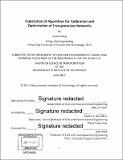| dc.contributor.advisor | Moshe E. Ben-Akiva. | en_US |
| dc.contributor.author | Zhang, Yundi | en_US |
| dc.contributor.other | Massachusetts Institute of Technology. Department of Civil and Environmental Engineering. | en_US |
| dc.date.accessioned | 2017-09-15T15:32:49Z | |
| dc.date.available | 2017-09-15T15:32:49Z | |
| dc.date.copyright | 2017 | en_US |
| dc.date.issued | 2017 | en_US |
| dc.identifier.uri | http://hdl.handle.net/1721.1/111407 | |
| dc.description | Thesis: S.M. in Transportation, Massachusetts Institute of Technology, Department of Civil and Environmental Engineering, 2017. | en_US |
| dc.description | Cataloged from PDF version of thesis. | en_US |
| dc.description | Includes bibliographical references (pages 65-66). | en_US |
| dc.description.abstract | Calibration of a DTA model is needed before applying it in a real-world road network. Calibration is often formulated as an optimization problem. This problem is difficult because of the large number of parameters, computational burden of the simulator, and stochasticity of the simulation process. Different algorithms to address the calibration problem are reviewed, and the WSPSA algorithm is showed best performance in offline calibration of a DTA model. This algorithm is an extension to the SPSA algorithm, by incorporating a weight matrix in the gradient calculation process which takes into account the heterogeneous correlation between measurements and parameters. However, existing literature on the WSPSA algorithm did not fully develop the model to accommodate all types of calibration problems. Specifically, a comprehensive framework to generate the weight matrix is not developed to account for traffic speed data and non-OD parameters. Besides, tests indicate that the convergence rate highly depends on the settings of the algorithm. In this thesis, extensions and improvements are made to different aspects of the WSPSA algorithm, including generation of the weight matrix, and updating the parameters. The proposed WSPSA algorithm demonstrates better performance in the synthetic test. Following the synthetic tests, a case study case study is conducted in a real-world network, where the proposed algorithm is applied to calibrate a microscopic traffic simulator. Sensor count and speed data from real-world observations are used to simultaneously calibrate OD demand and behavior parameters. The calibration yields satisfactorily accurate result, which proves superior performance of the proposed WSPSA algorithm. | en_US |
| dc.description.statementofresponsibility | by Yundi Zhang. | en_US |
| dc.format.extent | 66 pages | en_US |
| dc.language.iso | eng | en_US |
| dc.publisher | Massachusetts Institute of Technology | en_US |
| dc.rights | MIT theses are protected by copyright. They may be viewed, downloaded, or printed from this source but further reproduction or distribution in any format is prohibited without written permission. | en_US |
| dc.rights.uri | http://dspace.mit.edu/handle/1721.1/7582 | en_US |
| dc.subject | Civil and Environmental Engineering. | en_US |
| dc.title | Exploration of algorithms for calibration and optimization of transportation networks | en_US |
| dc.type | Thesis | en_US |
| dc.description.degree | S.M. in Transportation | en_US |
| dc.contributor.department | Massachusetts Institute of Technology. Department of Civil and Environmental Engineering | |
| dc.identifier.oclc | 1003292037 | en_US |
